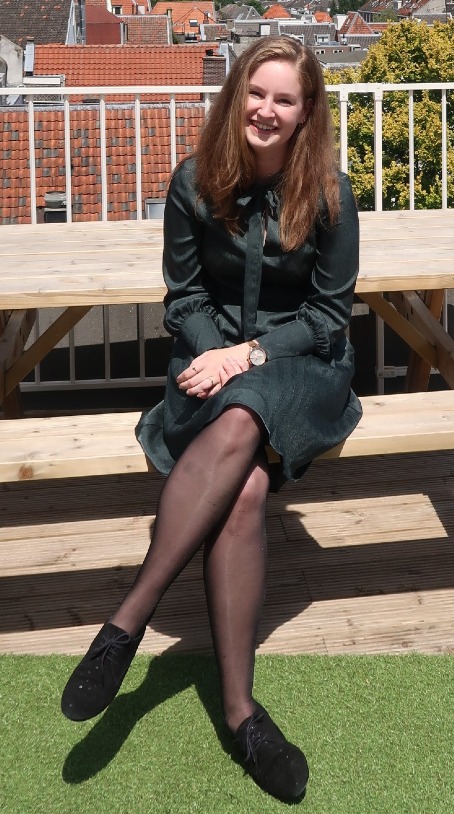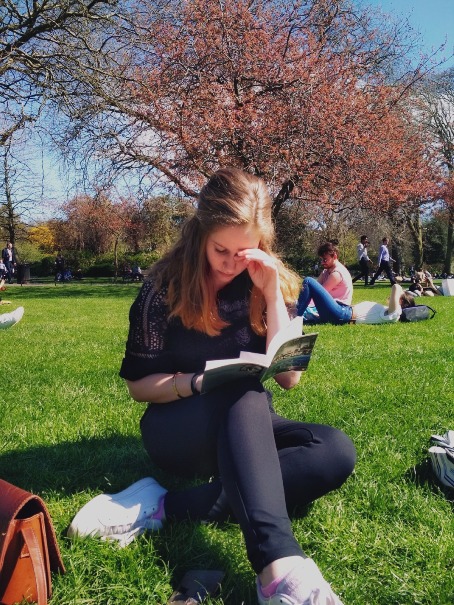“One day I can do everything and the next day I can't do anything."
| Date: | 08 December 2023 |
| Author: | Guest blogger |

The UG offers various options and facilities to students with (additional) support needs, but for students with a chronic illness which fluctuates over time, finding appropriate solutions can be more challenging. This is also true for Cynthia van Tongeren.
Cynthia is 27 years old, and is currently pursuing two master's degrees at the UG: the research master Art & Culture and the master Literary studies, and loves to read. Because Cynthia had Lyme disease in elementary school, permanent symptoms have arisen including chronic fatigue, rheumatism and fibromyalgia. How much she suffers from this varies. "One day I can do everything and the next day I can't do anything," she said. Because of the fluctuation of symptoms that cannot always be seen on the outside, misunderstanding sometimes arises among those around her.

No single solution
Commonly used facilities such as extra exam time or the use of a laptop, which can be recommended by the student counsellor and decided by the Board of Examiners, are very convenient for most students with support needs. However, for students with a chronic illness which varies in degrees of illness, some facilities are more difficult to use because the symptoms are not always present. Moreover, there is not always a good single solution available to support these students.
In Cynthia's case, for example, the rheumatic complaints cause difficulties with the accessibility of teaching locations. Some classrooms are only accessible by steep stairs, such as in the Calmershuis. "Climbing stairs on a bad day is almost impossible for me. The tricky thing is that it doesn't always bother me and so custom modifications are needed." Because of the change of symptoms, Cynthia depends on the flexibility of teachers. The learning objectives of a course can also be a complicating factor, such as attendance requirements. She wants to attend, but because of her complaints, she cannot always be present. In practice, this sometimes leads to misunderstanding and confusion. Her study advisor supports her in this regard in communicating with teachers.
Aletta Westra-Hofstee, project manager 'students with special needs’ indicates that schedulers, in consultation with study advisors, can sometimes do something in terms of room scheduling for students who need it, even when there are fluctuating complaints. Of course, they struggle with issues such as the availability of lecture halls and any facilities available in the hall. However, with consultation and timely raising the situation, much is possible.

Having to run harder than many others
"One thing I find hard to experience, is that teachers and fellow students sometimes suppose I'm not paying attention and I'm not interested. But it's the opposite, I am very interested, but on those days I am very tired and they don't know that or have forgotten. A teacher once gave me a very low participation grade because he thought I wasn't doing my best. I found this very difficult because, on the contrary, I try very hard and he did not know my circumstances sufficiently. So the grading was done mainly based on feelings and assumptions. You are already trying so hard to keep up, because you feel you have to run faster than many others. That's why these kinds of situations hit you extra hard.”
Inclusive language
People don't always realize how their assumptions and also their language can lead to stress and confusion. For example, Cynthia frequently gets the question, "So exactly how tired are you, compared to a normal person?" "It is important for people to be aware of what they say and how they say it. I often hear afterwards, "I didn't mean it that way," but that's how it comes across. It would be nice if people think before they say something that could be hurtful."
A great first step toward more inclusive language is the Inclusive Language Style Guide, published by the Diversity & Inclusion Office in April. The purpose of this guide is to address new developments in language to encourage and support UG staff and students to integrate inclusive language into their daily communication, teaching and work. The guide is a living, dynamic document, which can be read primarily as a way of thinking and is adjusted as new developments arise.
A big step going to the student counsellor
For many students, the threshold to the study advisor is already high, let alone the student counsellor. "For us, this feels like a big step, we often think that we have to solve it ourselves and shouldn't get involved. Of course, it's better to visit them on time, but there's also the fact that we often don't know exactly what's possible for us." Cynthia indicates, like many fellow students, that there is so much online communication via email and Brightspace, especially at the beginning of the year, that they don't always see the forest for the trees and thus miss important information.
Student Counsellor Wouter van Egmond: "Communication always remains a tricky subject. What works well for one person may be counterproductive for another. Especially around the start of their studies, students are offered a lot of crucial information on a variety of subjects. But quite understandably, this leads students to overlook some information. We try to take this into account as follows: when registering in Studielink, students can indicate that they would like to receive information on the subject of 'studying with a need for support’. This information is then sent to them step by step: in April, in June, in September and in November. So even in periods when there is less information overflow. For many students, a conversation with the student advisor or student counsellor provides more clarity about support options than any online information. Partly for this reason, we encourage students for whom customization is needed to contact a study advisor or student counsellor in a timely manner."
The Student Service Centre (SSC) offers UG students support for studying with an (additional) support requirement, among other things.
Call to students
Aletta Westra-Hofstee (project manager 'students with special needs) and Wouter van Egmond (student counsellor SSC) call on students with a need for support to keep approaching the study advisor as well as the student counsellor, no matter how scary this may feel. The contact is important to provide you with the right information, offer support where possible, think along, if you have any questions or problems. “We can advise, refer if necessary, or sometimes just offer a listening ear.”
About the author

Sometimes, we invite students and staff members to contribute to our blog page. This is one of those occasions. :)

